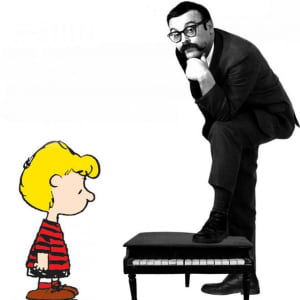
Vince Guaraldi
Jazz pianist Vince Guaraldi is best known for his soundtrack work in the classic ‘Peanuts’ cartoons.
Synopsis
Vince Guaraldi was born into a musical family in 1928. He began to learn the piano at an early age, and by the mid-1950s was an accomplished jazz musician. Guaraldi’s first breakthrough came in 1962, when his “Cast Your Fate to the Wind” became a surprise hit. That success soon led to the work for which he is best known—composing the music for an array of Peanuts cartoons, beginning in 1965 with A Charlie Brown Christmas. For his Peanuts-related compositions, Guaraldi received an Academy Award nod and several Grammy nominations. He died of a heart attack in 1976 at the age of 47.
Musical Beginnings
Vince Guaraldi was born in the North Beach region of San Francisco, California, on July 17, 1928. He was exposed to music by two of his uncles at an early age, and at 7 already began to show promise as a pianist. Guaraldi attended Lincoln High School and continued to develop his musical abilities, but his progress was interrupted after graduation when he was drafted into the army.
After serving as a cook during the Korean War, Guaraldi returned home and enrolled in courses at San Francisco State University. During this time he developed a love for boogie woogie and jazz and soon began to perform in clubs around the city. As his piano skills grew, over the next few years Guaraldi found himself sitting in with more established jazz acts like Cal Tjader, Bill Harris and Woody Herman before striking out on his own to record two albums for Fantasy Records—The Vince Guaraldi Trio (1956), which featured Eddie Duran on guitar and Dean Reilly on bass, and A Flower Is a Lovesome Thing (1957).
While indulging a newfound passion for Latin jazz, Guaraldi closed out the 1950s by performing with Tjader at the Monterey Jazz Festival. By many accounts, Guaraldi’s late-night performance at the concert was among the high points in a billing that featured many of jazz’s brightest.
Anatomy of a Hit
Inspired by the soundtrack of the Oscar-winning 1959 French/Brazilian masterpiece Black Orpheus, in 1962 Guaraldi released Jazz Impressions of Black Orpheus, which featured both his original compositions and cover versions of songs from the film. Fantasy Records released the track “Samba de Orpheus” as the first single from the album, selecting as its B-side the only other song from the album that would fit on the record, “Cast Your Fate to the Wind.”
Although the song’s inclusion was little more than an afterthought, it proved an important one for Guaraldi when it was put in heavy rotation by a few California disc jockeys. The song quickly became a hit, reaching No. 22 on the pop charts, performing a rare feat for a jazz record at the time. In 1963, “Cast Your Fate” was awarded the Grammy for Best Original Jazz Composition and was also the subject, along with Guaraldi, of the television documentary Anatomy of a Hit.
While enjoying his sudden success, Guaraldi continued to record, tour and experiment with his sound, collaborating with Brazilian guitarist Bola Sete on numerous projects as well as performing in May 1965 with the choir at Grace Cathedral. Inspired by Guaraldi’s performance, the legendary Duke Ellington would hold his first “Sacred Concert” there later that year.
Peanuts
Despite such innovative collaborations, however, 1965 brought another gig that would prove far more important to Guaraldi’s future. After hearing a recording of “Cast Your Fate to the Wind,” producer Lee Mendelson contacted Guaraldi and asked him to compose the music for a documentary about Charles Schulz and his Peanuts comic strip. Though the documentary was never released, Guaraldi’s musical themes were repurposed for the animated holiday special A Charlie Brown Christmas, airing in December of that year.
Featuring the now instantly recognizable “Linus and Lucy,” “Christmas Time Is Here,” “Skating” and other Guaraldi compositions, the special was an instant hit, spawning a long string of Peanuts projects that would all feature Guaraldi’s unforgettable music.
From 1965 to 1976, Guaraldi scored 17 Peanuts cartoons in all, perhaps peaking with the 1969 feature-length film A Boy Named Charlie Brown, which earned the pianist an Academy Award Nomination for Best Music, Original Song Score. He also received four Grammy nominations for his Peanuts work during this time, and the soundtrack for A Charlie Brown Christmas has since gone multi-platinum.
Legacy
In the late 1960s, Guaraldi moved to Warner Bros. and recorded three albums, the Peanuts-themed Oh, Good Grief (1968) and the 1969 records Alma-Ville and The Eclectic. Around this same time he also became acquainted with members of the Grateful Dead, with whom he would perform for a period as their interim keyboardist.
But despite the overwhelming success of Guaraldi’s Peanuts work, his popularity on the jazz scene during the 1970s faded, and he spent much of his later life playing in small Bay Area clubs. On the evening of February 6, 1976, shortly after completing the soundtrack for It’s Arbor Day, Charlie Brown, Guaraldi died of a heart attack between sets at Butterfield’s in Menlo Park. His Peanuts music was played at the church during his funeral, before his burial at Holy Cross Cemetery in Colma, California, just south of the city where he had spent most of his life.
Since his passing, Guaraldi’s music has been covered by the likes of Dave Brubeck, Wynton Marsalis and George Winston and featured on numerous compilations of his work. Among the most memorable and cherished holiday albums ever recorded, in 2007 A Charlie Brown Christmas was voted into the Grammy Hall of Fame, and in 2012 it was added to the Library of Congress’s list of culturally significant American recordings.
In 2009 the documentary The Anatomy of Vince Guaraldi was released, showcasing live performances from the revered musician as well as unearthed studio recordings. His compositions were also heard in the 2015 big-screen outing The Peanuts Movie.




